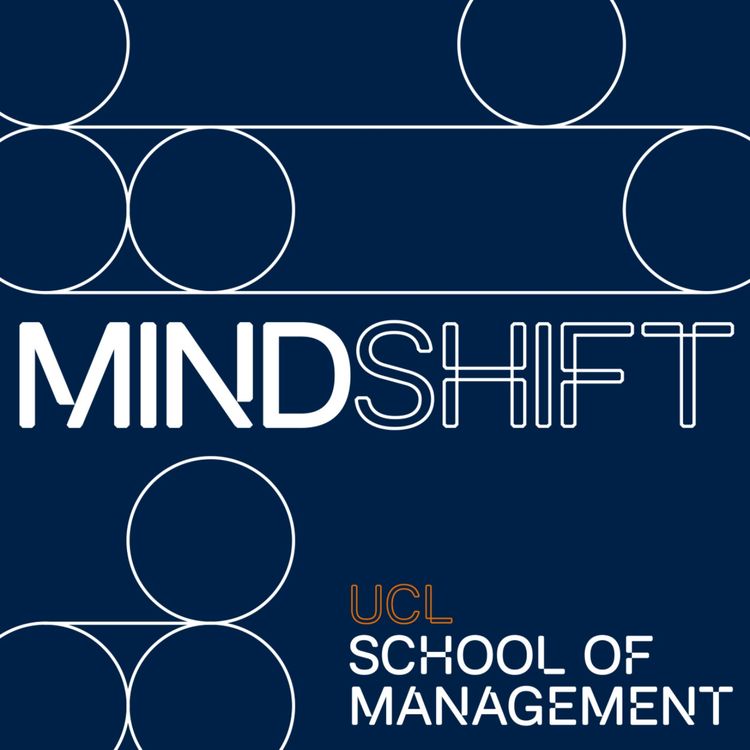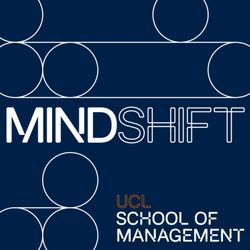Share

Mind Shift
Trailer Series 2 Mind Shift
Season 2, Ep. 0
•
In anticipation of Series 2 of the UCL School of Management Podcast Mind Shift, host and School Director Davide Ravasi shares what to expect from Series 2. Not listened to Series One yet? Find a list of all episodes and more about the podcast here.
More episodes
View all episodes

5. Queuing models and the implications of priority queue jumping
24:17||Season 2, Ep. 5In the fifth episode of of Series Two of UCL School of Management's podcast, host and School Director, Davide Ravasi talks to Rouba Ibrahim Professor and Head (Operations and Technology) to discuss queuing systems and the suggestions from Rouba's research with School of Managment co-authors to improve the queuing systems.They discuss, how you can manage a queuing system when the first come, first served model doesn’t work? What is priority queue jumping and why do people do it? Rouba aims to provide a greater understanding of why people cheat and the implications it can have.
4. Restructuring the unstructured
23:59||Season 2, Ep. 4In the fourth episode of Series Two of UCL School of Management's podcast, host and School Director, Davide Ravasi talks to Associate Professor Onesun Steve Yoo and UCL School of Management alumni Mahesh De Zoysa as they share their insights on the use of natural language processing, machine learning and automated analytics to deliver reliable information to improve performance in industrial businesses, from the challenge of dealing with large, complex and often unstructured datasets, to finding the bigger picture for its implementation in the market.Mahesh and Onesun Steve discuss the benefits of applying machine learning to large scale procurement and how analytics can support the improvement of supply chain practices. Their project has initially been funded by Innovate-UK and brings together academic research with industry experience.
3. AI and the future of recruitment
25:34||Season 2, Ep. 3In the third episode of Series Two of UCL School of Management's podcast, host and School Director, Davide Ravasi talks to Deputy Director (EDI) at UCL School of Management, Dr. Sunny Lee and UCL alumna Dr. Kiki Leutner as they share their insights on how companies are using artificial intelligence to improve and streamline their recruitment processes and discuss the pros and cons of using machines to process this data.Dr. Kiki Leutner and Dr. Sunny Lee discuss the advancements of AI in the recruitment process, drawing on real-life examples where the technology has been a success and addressing areas where improvements still need to be made. They look at the ethical application of AI debasing algorithms and highlight the importance of legislation and regulation of the technology.
2. Managing the Future of Work in a post-pandemic landscape
32:07||Season 2, Ep. 2In the second episode of Series Two of UCL School of Management's podcast, host and School Director, Davide Ravasi talks to James (Jim) Berry, Assistant Professor and Programme Director of the UCL MBA to understand the future of work and how best to foster a collaborative and creative environment with the new hybrid model of working. Jim shares his knowledge of the many facets of this new workplace cultural revolution. In this podcast, he answers the difficult questions, such as: how much of a threat AI and a global workforce is to job security, whether anybody benefits from remote surveillance, and does hybrid working help or hinder working relationships? See Jim's profile and find out more about his current research interests.
1. Understanding Diversity and Inclusion in the Workplace
28:45||Season 2, Ep. 1In the first episode of Series Two of UCL School of Management's podcast, host and School Director, Davide Ravasi talks to Clarissa Cortland and Felix Danbold about their research into diversity and inclusion in the workplace and understanding how organisations quantify their diversity goals. Felix explains how dominant groups are faster to draw the diversity lines than members of non-dominant groups that the diversity initiatives are trying to help and the effects of this in creating a diverse organisation. Clarissa shares her research into the perspective of diversity goals in the workplace from the non-dominant groups and the barriers they face due to stereotype threat. See Clarissa and Felix's profiles and find out more about their current research interests.
6. How to avoid micromanaging and inhibiting creativity
31:39||Season 1, Ep. 6In the sixth episode of UCL School of Management's new podcast, host Vaughn Tan talks to Colin Fisher about his work on micromanagement and how to avoid it, especially in industries that require creativity. Colin explains how his experience as a professional musician helped shape his research focus, and the idea of how real-time interaction and improvisation in small groups lead us to new thoughts, new ways of behaving, and in some cases come up with something new that as individuals we wouldn't think of. You can find out more about Colin's work here.
5. The impact of frontline employee innovation
32:36||Season 1, Ep. 5In the fifth episode of UCL School of Management's new podcast, host Vaughn Tan talks to Bilal Gokpinar about his work on frontline employee innovation. Bilal explains the short-term benefits of employee mobility such as knowledge transfer and the longer-term benefits where employees become better innovators. You can find out more about Bilal's work here.
4. Blockchain: Decentralising organisations and solving the collective action problem
31:26||Season 1, Ep. 4In the fourth episode of UCL School of Management's new podcast, host Vaughn Tan talks to Jean Philippe Vergne (JP) about his work on blockchain technology, analysing the origins of blockchain and decentralisation and how it has the potential to disrupt organisations, working styles and even solve the collective action problem. You can find out more about JP's work here.